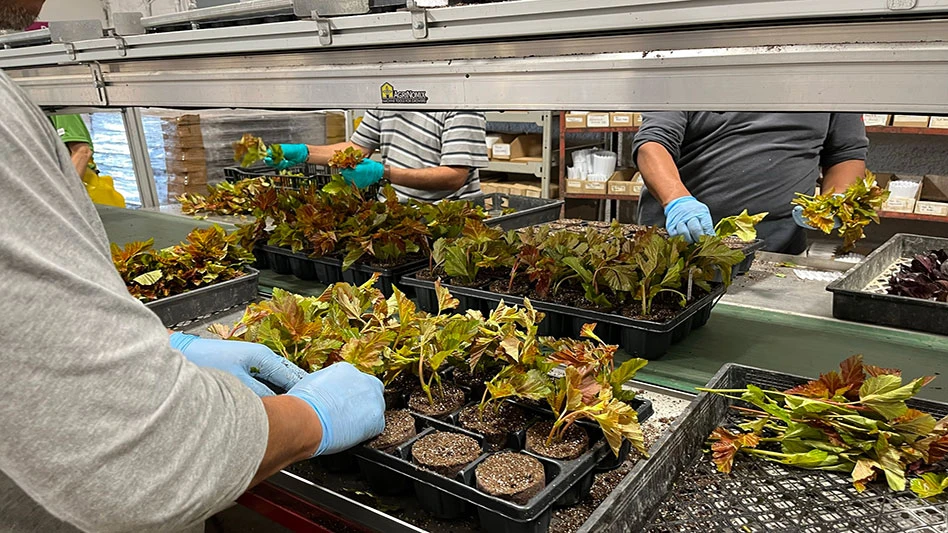
Matt McClellan
A federal judge in Georgia has blocked the Biden administration from enforcing a rule that bars employers from retaliating against farmworkers who are in the U.S. on temporary H-2A visas and trying to form unions in 17 Republican-led states, Reuters reports.
U.S. District Judge Lisa Wood in Brunswick, Georgia, said on Monday that the U.S. Department of Labor rule is invalid because Congress explicitly excluded farmworkers from such protections when it granted them to other private-sector workers in the National Labor Relations Act, according to Reuters.
Wood granted a preliminary injunction to the states led by the office of Republican Kansas Attorney General Kris Kobach — along with agricultural trade group the Georgia Fruit and Vegetable Growers Association and Miles Berry Farm in Georgia — pending the outcome of their lawsuit filed in June, the same month the rule went into effect, Reuters reports. The U.S. Department of Justice is defending the rule.
H-2A workers are temporary, nonimmigrant workers lawfully admitted to the U.S. under the Immigration and Nationality Act (INA) to perform temporary or seasonal agricultural labor or services, per the U.S. Department of Labor.
The Farmworker Protection Final Rule, announced in April, would provide strengthened worker protections in the H-2A program to help ensure the H-2A program doesn't have an adverse effect on the working conditions of similarly employed workers in the U.S.
The department said that workers employed under the H-2A program can face unique risks of exploitation, due to the temporary nature of the work, frequent geographic isolation and dependence on a single employer for housing, transportation and immigration status, as well as risks of human trafficking, unsafe transportation and retaliation.
For workers not protected by the National Labor Relations Act, the rule would protect workers engaging in self-organization or concerted activities, according to the DOL. The NLRA grants those protections to most other private-sector employees, but not farmworkers, according to Reuters.
But the states in their lawsuit say Congress never gave the Labor Department the power to grant organizing rights to H-2A workers, according to Reuters.
"The states argue that, if the Final Rule were enacted, alien agricultural workers would receive rights that American citizens working agricultural jobs do not enjoy,” Wood wrote in her order.
AmericanHort plans to continue its push for improvements to the H-2A program.
“The Department of Labor's (DOL) delay in implementing the H-2A Worker Protection Rule, prompted by the recent Georgia case decision, highlights the concerns regarding the rule's suitability and the perceived haste in its advancement. AmericanHort is committed to collaborating with the Department of Labor to develop an H-2A Rule and program that effectively serves current and prospective participants,” says Matt Mika, VP of Advocacy & Government Affairs at AmericanHort.
According to GPB, a Georgia news outlet, at the center of the plaintiff’s argument is that the Department of Labor shouldn’t have the regulatory power to change decades of policy, power they defer to Congress.
Wood agreed, writing that "...by implementing the Final Rule, the DOL has exceeded the general authority constitutionally afforded to agencies. ... The DOL may assist Congress, but may not become Congress.”
“As written, the U.S. Department of Labor’s new Worker Protection Rule is likely to impose significant burdens on agricultural producers, particularly smaller producers. Increases in operational costs, legal uncertainty and slower job creation are a few of the top concerns,” said Terry Vandercook, sales development coordinator at Legacy Labor. “The expanded liability found in the rule may discourage growers from outsourcing much-needed seasonal and temporary agricultural labor. Many growers utilize programs, such as H-2A, to meet their temporary labor requirements when local labor is not available. Without seasonal and temporary workers (H-2A), these same growers may be forced to put off expansion opportunities, limit production and ultimately may find their business at risk.”
Latest from Greenhouse Management
- KETOS launches in-house environmental lab testing for water quality
- Kaylee Marr to lead digital sales at Priva North America
- Disaster!
- Should we start calling natives 'eco-beneficial plants'?
- FNGLA celebrates passage of 2025 'Florida Farm Bill'
- Jim Owen joins Profile Products as technical services manager
- The Growth Industry Episode 4: How federal budget cuts are affecting horticulture nonprofits
- The HC Companies, Classic Home & Garden merge as Growscape





